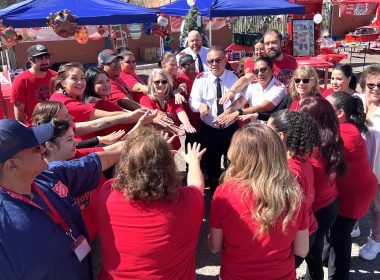IN PROCESS
by Glen Doss, Major –
Zenda Haney |
“I had never seen so many genuinely happy people. My whole life had been pain; I deeply wanted the peace they had,” recalls Zenda Haney, 48, of her first impressions of the Los Angeles Safe Harbor program. “I was so tired of being sad, so I set out to learn as much as I possibly could.”
Zenda’s hard road to recovery began in Chicago where she says she and her siblings were essentially terrorized by their mother. “My earliest memories are of being beaten,” she explains.
Zenda’s parents were divorced when she was small. Between the ages of eight and twelve she resided in Los Angeles with her father where, she says, “there was a balance. We had rules, but it was also a loving environment.” Her father remained the one stable force in her life. When she returned with her mother to Chicago, “he was hurt–he was very, very hurt,” remembers Zenda; “however, my dad remained my friend, my teacher, my mentor.”
 In Chicago, the violence immediately “picked back up.” While her mother, a nurse’s aid, was away at work, Zenda and her two sisters worked at home: “one sister had the responsibility of cleaning; the other was responsible for cooking.” However, since she was the most capable, Zenda adds, “I had to do a lot of things a 12-year-old shouldn’t have to do, like pay the bills and do the grocery shopping. There was a lot of pressure on me. Additionally, we had to take care of our little brother.
In Chicago, the violence immediately “picked back up.” While her mother, a nurse’s aid, was away at work, Zenda and her two sisters worked at home: “one sister had the responsibility of cleaning; the other was responsible for cooking.” However, since she was the most capable, Zenda adds, “I had to do a lot of things a 12-year-old shouldn’t have to do, like pay the bills and do the grocery shopping. There was a lot of pressure on me. Additionally, we had to take care of our little brother.
“I was a very nervous child,” she says, “and I was terrified of my mother. Every time she came in, I held my breath for fear she would think I had done something wrong. If she found a washed dish that wasn’t dry, we’d get beat. If my brother didn’t take a bath, we’d get beat. If the house wasn’t clean, we’d get beat. I was struck on the face with anything that was at hand. Once, when she was doing my hair, she hit me in the face with a hot comb.”
Married shortly after high school, Zenda felt she had finally found her “knight in shining armor.” She tried hard to be a good wife and mother (“I had five children,” she says) but the marriage became increasingly strained—“My husband was very manipulative.” Coming upon him using crack cocaine in 1995, she explains, “I didn’t want to make any waves.” Desperate for anything that they could finally do together, she asked him, “Can I have some?” Later, when she discovered he was having an affair, she says, “I was devastated. I made him leave and then started using [the drug] more and more.”
In 2002 when she got the news that her father was on his deathbed, she felt she was also losing her best friend. “For 90 days I ran like the wind! Every time I hurt, I would use [the drug]. No one knew where I was. Eventually, I realized I could come up dead.” Tired of hurting, tired of running, Zenda checked into the Safe Harbor program in March 2003.
Because she knew very little about the Christian faith, she explains, “I simply watched and listened. I heard people talking about God’s forgiveness, and I noticed they weren’t afraid to praise God; they didn’t appear embarrassed. I was so tired of being sad, so I stopped fighting and prayed, ‘Lord, help me to make it. Help me to forgive myself because I can’t understand how a mother could leave her kids and go out and use drugs! Oh, my God, that hurts! Lord, not my will but yours be done because I don’t know anything!’ ”
Zenda points out: “I noticed that the more I spend time with my children the more I talk about God. I knew nothing about him before. Yet today I am finding his inner peace. I’m attending Bible studies so I can learn even more. My kids and I—we’re learning together.”











